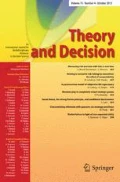Abstract
Counterexamples to two results by Stalnaker (Theory and Decision, 1994) are given and a corrected version of one of the two results is proved. Stalnaker's proposed results are: (1) if at the true state of an epistemic model of a perfect information game there is common belief in the rationality of every player and common belief that no player has false beliefs (he calls this joint condition ‘strong rationalizability’), then the true (or actual) strategy profile is path equivalent to a Nash equilibrium; (2) in a normal-form game a strategy profile is strongly rationalizable if and only if it belongs to C∞ , the set of profiles that survive the iterative deletion of inferior profiles.
Similar content being viewed by others
REFERENCES
Stalnaker, R. (1994), On the evaluation of solution concepts, Theory and Decision 37: 49–74.
Stalnaker, R. (1996), Knowledge, belief and counterfactual reasoning in games, Economics and Philosophy 12: 133–163.
Author information
Authors and Affiliations
Rights and permissions
About this article
Cite this article
Bonanno, G., Nehring, K. On Stalnaker's Notion of Strong Rationalizability and Nash Equilibrium in Perfect Information Games. Theory and Decision 45, 291–295 (1998). https://doi.org/10.1023/A:1005090905103
Issue Date:
DOI: https://doi.org/10.1023/A:1005090905103



